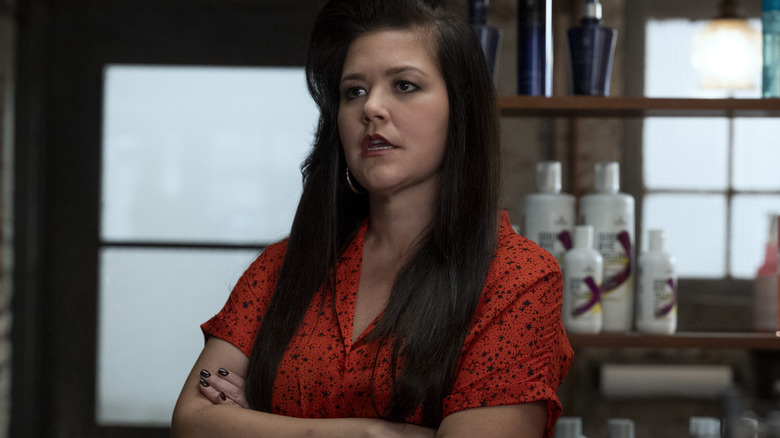
The dark comedy "Kevin Can F*** Himself" centers around Allison Devine-McRoberts, a long-unhappy housewife buried so long in the shadow of her immature husband Kevin (Eric Peterson) that she reaches the end of her rhetorical rope: she needs out. She only sees one path forward, and that is to kill Kevin and reclaim her own life. She ends up finding an unlikely partner in crime with her neighbor Patricia (Marry Hollis Inboden), a mainstay of the family's life whose own path of self discovery leads to friendship and a desire to help the desperate Allison.
The show is notable for its brilliant send-up of old sitcom stereotypes, its unusual and effective cinematography switches, and some exceptional performances from its leads. I spoke with Mary Hollis Inboden about the series, Patty's journey, and more.
'We've Never Before Seen That Genre-Shifting'
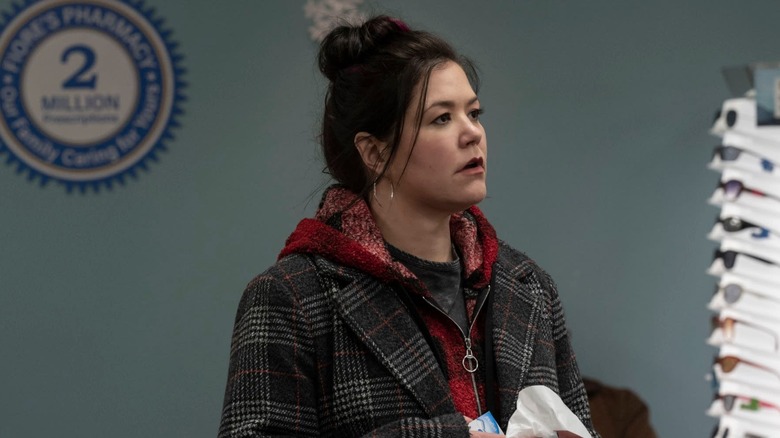
I love the show. It's very unique. What attached you to the project?Its uniqueness for sure, I had never read anything like it. Truly, it took me about three reads during pilot season a few years back to even understand what I was looking at, because we've never before seen that genre-shifting in one complete piece. What [also] really drew me to it was the story. Patty makes a big appearance in the first episode, but when we were auditioning I didn't have a full scope of what her character would become or where that was headed. I really attached myself to this sitcom wife, and the first shift of her without the laundry basket moving into this sort of single-cam, darker world that is her reality, I thought "oh my gosh, we're going to tell that story." Not that this woman is completely miserable and can't be this sort of shaken out of whatever current mood she's in, this is something that's happened over a 10-year, really rotten marriage with the very toxic male figure that is Kevin.
I thought if we can head in a direction of Kevin not being a literal man and [instead] being this idea, this larger idea of toxic masculinity, and how over the years sitcoms have ... sort of accidentally pushed that message through even more because of an old model or tired jokes at other people's expense. I thought that would be really exciting. And I also just enjoyed the female friendship that starts to gather, however slowly, in that first episode, I thought "why is Patty telling Allison about this?" I mean, they've spent 10 years in a room together. Why is this just coming out now? I thought "I hope that this is a show about female friendship" and it certainly ended up being that.
'She Attacks Allison Because She Thinks Allison's Pitiful'
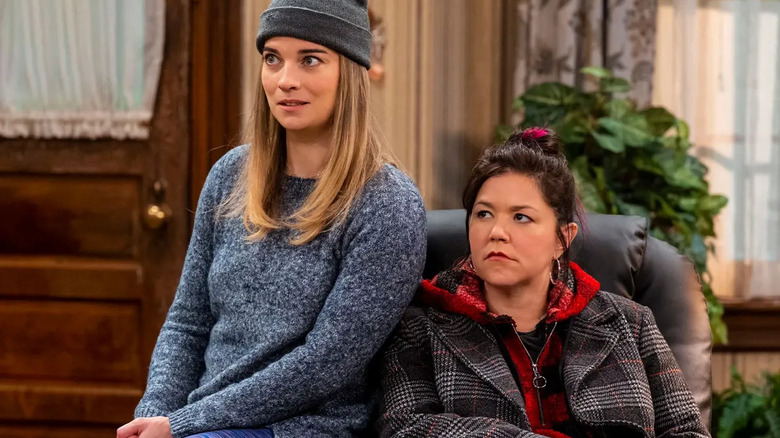
Absolutely. It's interesting because with Allison, behind the scenes we've seen 10 years of these microaggressions and regular aggressions, but Patty's journey is more complex because she goes through a real evolution in the first season. Could you tell me about her journey?
I'd love to. Allison so singular minded, and the joy of the show, the sort of bliss of it, is when she figures out [...] that she's got a solution to a problem, and that is to kill her husband. We love that part. But for Patty ... our show centers around this multi-cam sitcom world, and in Kevin's universe Patty is seemingly one-of-the-boys when it starts. She goes along with Kevin because, honestly, it's something to do, it's a gang to hang out with, and who would ever be a combatant to Kevin? Who would ever shake his tree?
I think Patty's journey throughout the first season is one that's so exciting, because she is more than meets the eye. So often that happens with female characters in sitcoms, we become tropes. You know, you've got the "nagging wife" or the "brash wife," and you've got the either very silly and sort of crazy next door neighbor, friend character, or [you have] the bitchy next door neighbor or friend character. I was so excited to lean into that trope to help bust it open [and see] what it informs in the sitcom, and what it informs is a woman who maybe comes across as bitchy or as tomboyish because she's struggling with her own sexuality and hasn't quite faced that yet because it's embarrassing to be a certain age and not have, you know, sort of come to the truth about yourself. But I also think that she has got this toughness, because if you really look at Patty, she's had to keep her older brother alive their entire lives, she is strapped with that responsibility.I think that is so powerful about Patty and it really gives her so much more strength than what we get to explore in Kevin's universe. So when we're in the multi-cam world, you would never guess that Patty might perhaps like women, or that she's just kind of a tough girl, you know, quote-unquote, and she also is seemingly sort of bitchy and miserable. She attacks Allison because she thinks Allison's pitiful. When they come out in the broad daylight in the single-cam, there they're both so much more than that. I think once they find each other, they understand that they can sort of live their lives the way they want to with the help of this friendship, and sort of busting some codes, you know?
I think that's such a lovely part of it. And the characters evolved so much, which is rare for female characters in sitcoms of that vein.
Yeah, and the evolution of Patty is ... she really does get to open up. Allison is singular, and Patti is exploring, you know, she's like "I'm this person, and I'm this person." That's such a treat to play, especially when you're strapped in one land where you're just this sort of sardonic "bitchy neighbor."
'When You're Playing For Laughs It's Impossible To Take A Step Back'
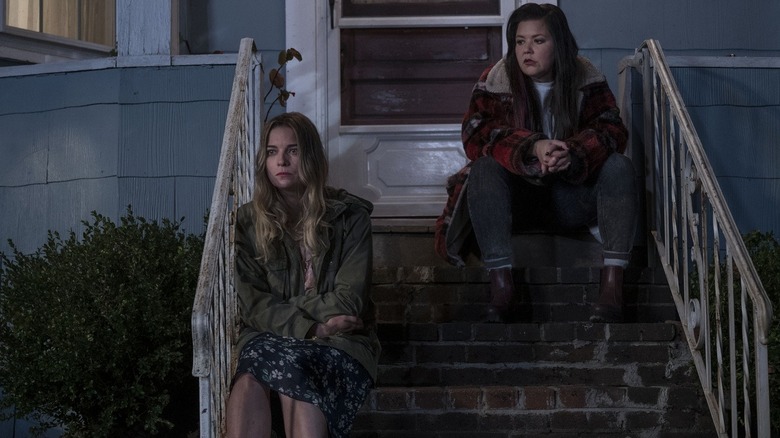
One of the things that drew me to the show to begin with was that it's a revenge story that switches genres, and I really love that. Does that add challenges to your interpretation of your character?Oh, gosh, that's a good question. Yes, I believe it does. I think it's more so that everything's played for a laugh in the multi-cam, so you have that constant reminder. We were lucky enough to have a live studio audience, 10 people who were COVID-tested every day, for our actual filming of the multi-cam. I think when you're playing for laughs it's impossible to take a step [back] and understand the consequences of so many of the things that are said, their real-life consequences. One of the challenges in the switch is not letting anything have too much weight or landing too hard on you, you know, like we just scroll over all the sort of cruelty and evilness of Kevin, or all of them, in order to catch the laugh.The second that you become very aware, that's the challenge because ... as great as some of [multi-cam sitcoms] are, and as wonderful as they've treated us throughout our childhoods and even now, I think they are there to catch a laugh and to not be super aware. That's the character of Kevin, he's aloof and unaware and we all are ... I guess my long way around telling you this is having those saddled right next to each other, those two genres, the challenge is not knowing more than you can know, and not having more empathy than you should, and not being too aware of the joke and its consequences. Especially for Patty and Allison when usually it's a joke at our expense, because we're female.
'It Was Very Important That We Created A Show That Could Survive'
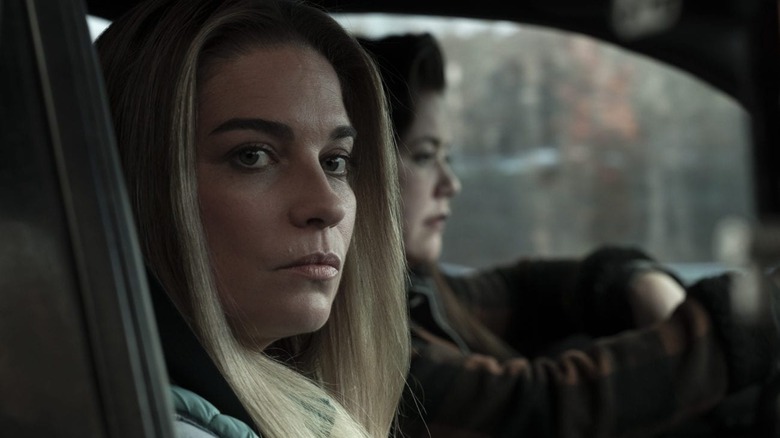
It's interesting because the show is so very clearly inspired by this Kevin James-style series, but did that come up on set or inform how certain things were discussed for character choices, or in the day at all? Or is it just in the concept, and that's where it was left?
In the concept [mainly]. We didn't talk so much specifically about Kevin James or "King of Queens," we talked mostly broadly about male-led sitcoms that have come before, and how best to not mock or mimic those as one of the goals of our creators. I think that is so important to the show, and how it works to write something that could be on CBS-primetime right now.
As obnoxious as you find Kevin, and we're definitely telling you that you should find him annoying and obnoxious and perhaps borderline abusive to his wife, even though we're laughing about it ... it was very important to our showrunners that we created a show that could survive right now as multi-cam. Paying homage to those was also important. That's where the conversation sort of started and ended. We [did not] want to dismantle sitcoms forever, we've just made a show about a particular guy who is ruining the life of his wife and her getting to... have a response, as extreme as it might be. [At the same time] we hope we find a little bit of comedy and also a little relatability.
One thing that I really did like about the show is that the jokes in the multi-cam world land but they're archaic. They're like jokes that would have worked in 1995 or 2000.
Absolutely, and I think one of the goals maybe for our second season is to bring Allison a little bit more up-to-date. We've showed her as the sitcom wife who exists as sort of an Edith Bunker character, just kind of a go-along, and now we need to update her into the shaking-her-head, hand-on-her-hip wife that's like "you are a doofus."
'...and Kevin Can F*** Himself'
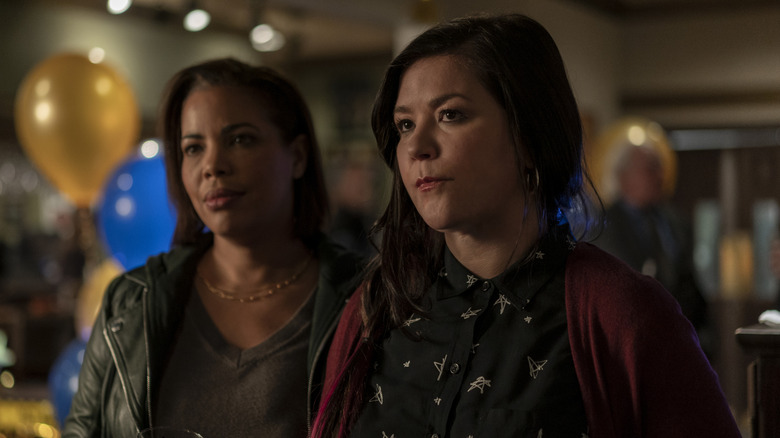
Love it. In that vein, the next thing I wanted to ask is what's next for Patty in season 2? I've seen so little of our of our futures on the show, but she and Allison had a failed attempt to rid the world of Kevin. It continued at every step to backfire on them, but I don't think that all hope is lost and I think that they are really going to continue to pursue that goal. For Patty, specifically, I think now she's realized that her glass doesn't have to be half-empty all the time. I can't wait to see how she embraces her newfound love for Tammy Ridgeway because I think that some of that "I'm with her just because she's a cop" has fallen away.
I do think that we're going to have some interesting scenes and moments between Patty and Allison trying to figure out if their friendship is just a very powerful one, if they have come together through the trauma of being women in Kevin's universe, or if it's perhaps even more than that. So I think, in moving forward, I would like to see these women continue to try to dismantle the patriarchy, be as rambunctious as possible, and when they make bad decisions that they are called to suffer the consequences of those. That is something that I feel is sort of reflective of something we experience in life right now, [where] men sometimes don't have to suffer the same consequences that women do, and they're also constantly in rooms where decisions are made about women and for women. We're fighting that, and Kevin can f*** himself.
"Kevin Can F*** Himself" is available on AMC, and its first season is now available on Blu-ray.
Read this next: The 15 Best '80s Comedies Ranked
The post Mary Hollis Inboden On Bringing Reality Into The Multi-Cam Sitcom With Kevin Can F*** Himself [Interview] appeared first on /Film.
0 Commentaires